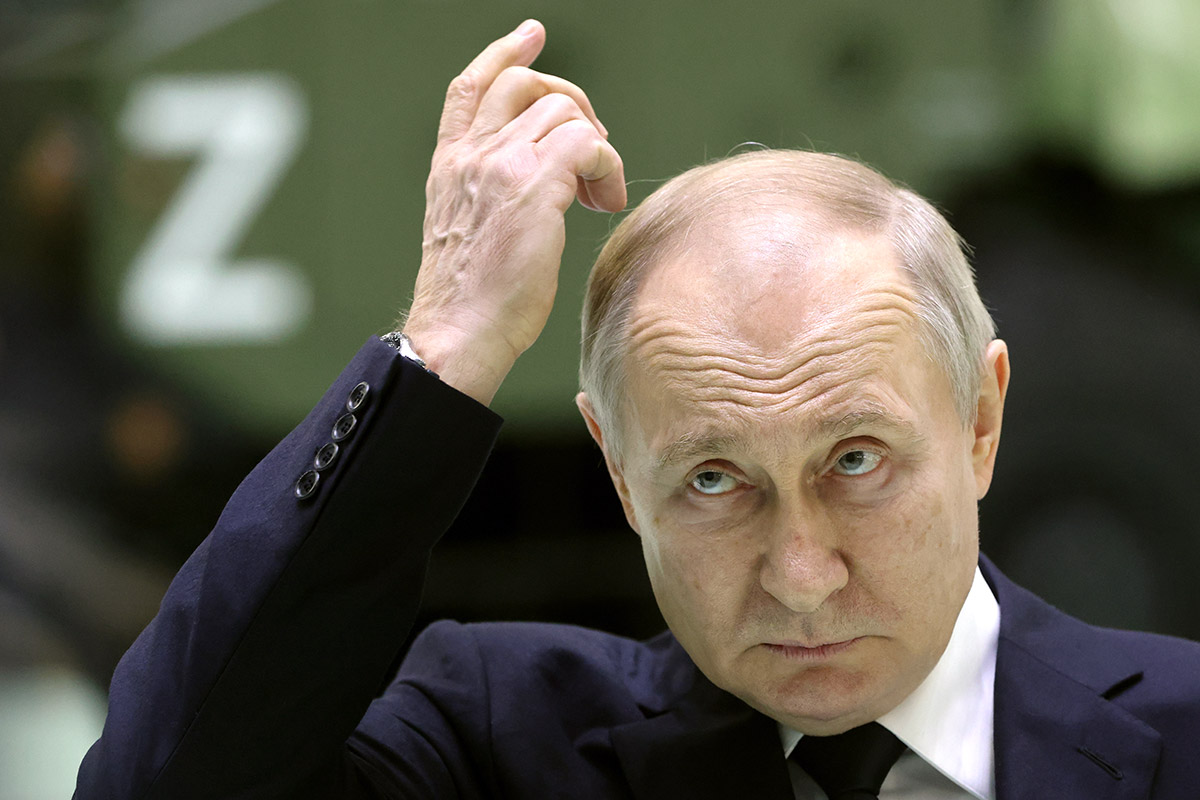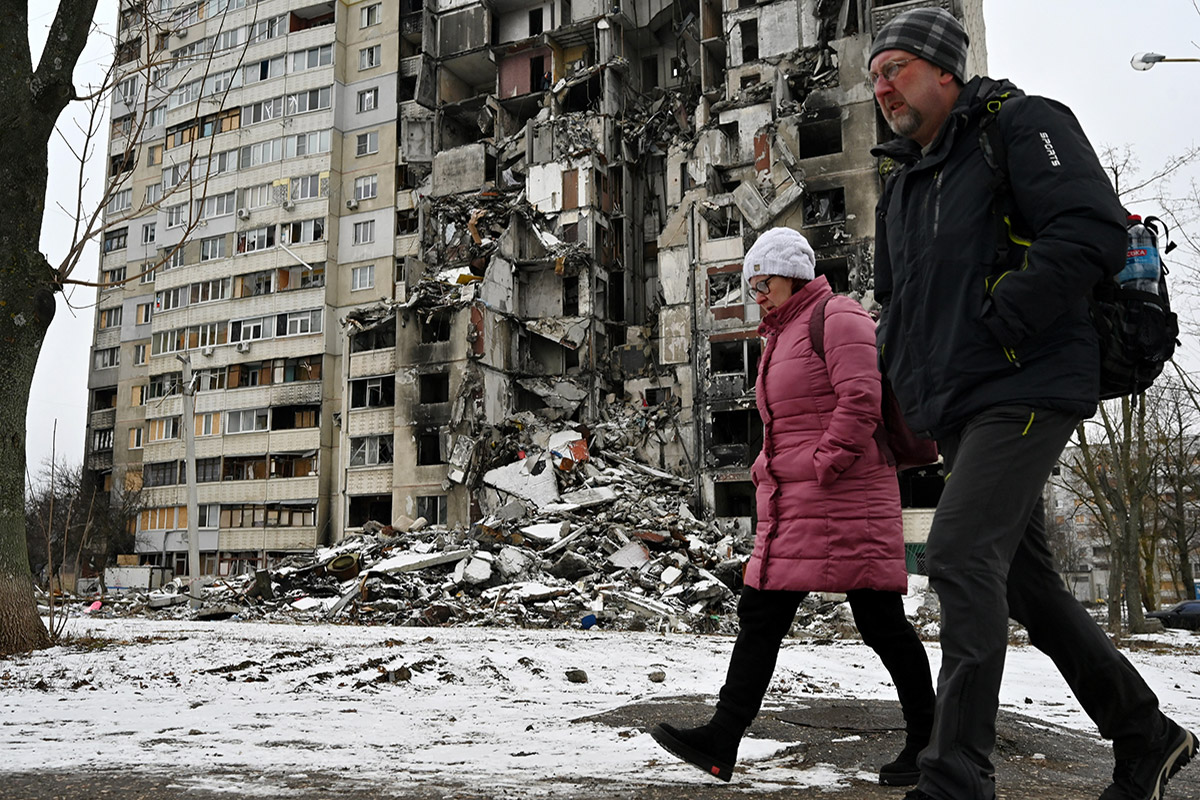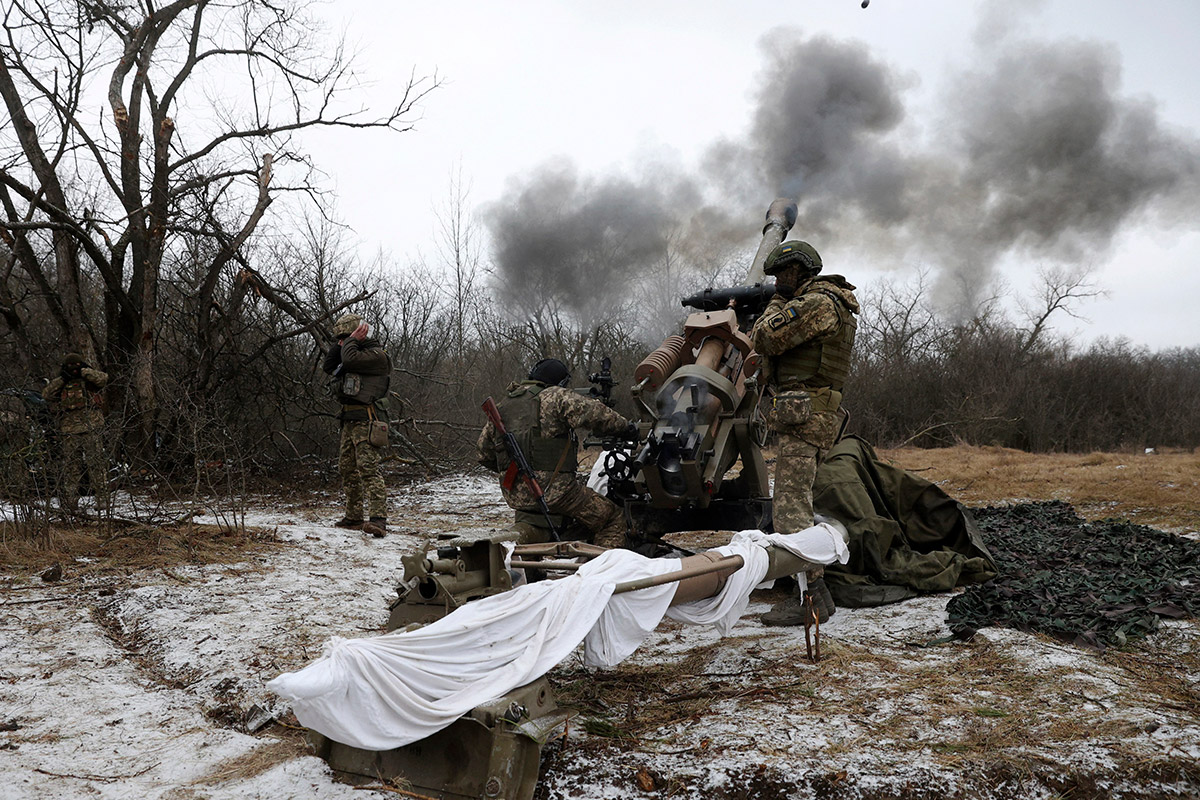24 February 2023
Russian president highly likely to remain in power despite Ukraine conflict setbacks
Russian President Vladimir Putin's term as president officially ends in 2024 but he is highly likely to ‘contest' the 2024 presidential election despite his dwindling popularity as a consequence of the war in Ukraine. Carlos Berrera and Aditya Pareek analyse scenarios around the future of Putin's presidency and the war in Ukraine.
Key points
- Janes assesses there is a high probability that Putin will remain in power through to the 2024 election
- This likelihood would decline if the Kremlin is unable to reach certain strategic and military goals before the election
- Janes assesses that a likely Russian offensive in the first half of 2023 would be unlikely to change the course of the conflict
Future of Putin's presidency:
Russian President Vladimir Putin's current term is scheduled to officially end in March 2024. The amendments to the Russian constitution, adopted in 2020, ‘nullified' Putin's previous terms, which allows him to run for the presidency in 2024 for a six-year term, as well as for another term in 2030, extending his potential rule to 2036.
The future of Putin's presidency is closely connected to the outcome of the ongoing Russia-Ukraine conflict. To maintain and increase the support of the electorate, the Kremlin likely aspires to conclude the ‘special military operation' before the next presidential election, and to showcase its victory, or any result the Kremlin can present as such, to the electorate. If the Kremlin does not achieve its strategic and military goals in Ukraine in time for the election, the likelihood of a transition of power away from Putin increases. Janes examines possible scenarios of the conclusion of Putin's current presidency.

Russian President Vladimir Putin speaks at the Obukhov State Plant in Saint Petersburg, Russia, on 18 January 2023. (Contributor/Getty Images)
Scenario 1: Putin remains in power
Probability: high
On 2 November 2022, Dmitry Peskov, press secretary for the president, announced that Putin had yet to decide if he would participate in the next presidential election. However, both Russian liberal and Kremlin-backed news outlets reported during October–December 2022 that Putin would run in the forthcoming election.
According to polls published by independent research organisation Levada Center, as of November 2022, Putin's political standing is very secure with a 79% approval rating compared with a 63% expressing approval in November 2021, suggesting that the invasion of Ukraine has strengthened his popularity. Putin's influence over the elite and his control over the security apparatus remain strong and solid.
The support of the Russian electorate is likely to be compromised if the conflict in Ukraine continues to drain the country's economic and human resources without concluding in a Kremlin declaration of victory. However, this is unlikely to influence the likelihood of Putin's victory, given presidential elections in Russia are almost certainly manipulated and open to fraud.
The status of the war in Ukraine also affects the likelihood that elections will be cancelled or postponed. According to the Russian law, this is possible if martial law or full mobilisation is declared.
Scenario 2: controlled transition of power
Probability: moderate
The ongoing conflict between Russia and Ukraine has likely affected the elite's perception of Putin. The president has gone from the symbol of stability for the last 20 years to becoming the main destabilising factor for Russia's external and internal affairs as a consequence of the war in Ukraine and the performance of the army.
The public perception of the Russian army has almost certainly been affected by the war in Ukraine, with Russia's economy and tech paying a high price as a result of sanctions. Furthermore, Putin's age and speculation over his health have compromised his credibility.
If Russia's military position in Ukraine drastically deteriorates, there is an increased likelihood that the president's inner circle and the elite will push Putin to nominate a successor. If Putin still has a strong hold on power at such a stage, he would meet limited or no resistance from different elite clans and would be able to choose a politician who would be able to protect his heritage.
Some of the most likely candidates include First Deputy Chief of Staff of the Presidential Administration Sergei Kiriyenko; Dmitry Patrushev, son of Secretary of Security Council Nikolai Patrushev; Mayor of Moscow Sergey Sobyanin; and Prime Minister Mikhail Mishustin. According to the Russian constitution, Mishustin would substitute Putin if he is unable to serve his term for any reason.
Scenario 3: collective leadership power transition
Probability: low
The most likely scenario in case Putin cannot appoint a successor – if he is ousted or dies in office, for example – would be the creation of a collective leadership body consisting of the representatives of the Kremlin's elite and members of the Security Council. This would be similar to institutions operated following the rule of former premiers Joseph Stalin and Nikita Khrushchev during the Soviet period. Such a transition would avoid rivalry among elite groups outside of the Kremlin and Security Council.
Scenario 4: military coup
Probability: very low
Following Russia's invasion of Ukraine, some commanders such as Ramzan Kadyrov, head of Chechen Republic, or oligarch Yevgeny Prigozhin, founder of private military company (PMC) Wagner Group, became very vocal in voicing their opinions on the failures of top military commanders of Russia's armed forces. However, both men are unlikely to have a future in politics at the state level due to a lack of support from the elite.
Scenario 5: Putin loses power to opposition
Probability: very low
The most prominent opposition leaders, such as Alexei Navalny or Ilya Yashin, are imprisoned, and restrictive legislation and state repression have forced others to leave the country. Consequently, it is highly unlikely that the opposition in Russia can overthrow the Putin administration in the short term.
Scenario 6: unco-ordinated palace coup
Probability: very low
Janes assesses that Putin's close circle has different factions. The ‘Siloviki' consists of former security and intelligence officials such as Igor Sechin, CEO of the state hydrocarbon company Rosneft; Alexander Bortnikov, incumbent chief of the Federal Security Service (Federalnaya sluzhba bezopasnosti: FSB); Sergei Naryshkin, incumbent chief of the Foreign Intelligence Service (Sluzhba vneshney razvedki: SVR); and Patrushev. The ‘Technocratic' faction consists of Kiriyenko; Central Bank Governor Elvira Nabiullina; Sberbank chief Herman Gref; and Mishustin.
In case of an unplanned grab for power by an individual or group from inside the Kremlin elite, infighting between the two factions would be likely. The resulting chaos would lead to several leaders emerging as self-proclaimed ‘interim presidents' and would increase the likelihood of a power vacuum emerging.
Future of the Ukraine conflict
From the beginning of the conflict in February 2022, Russia did not appear to have well-defined strategic goals. When the initial goal of a rapid victory failed, it became evident that the Russian leadership did not have a clear plan for a war lasting more than a few weeks. The Kremlin's narratives of denazification and demilitarisation of Ukraine failed to convince domestic or international public opinion of the invasion's goal. It is unlikely that the Kremlin has a realistic strategic vision for the conflict development beyond the first quarter of 2023.
Janes assesses that Russia expects the winter to be a decisive factor in the crisis, with the cold weather coupled with the targeting of energy infrastructure undermining the morale and resistance of Ukrainian forces and affecting the solidarity of the Western countries. Russia continues large-scale strikes against Ukraine's critical national infrastructure (CNI), hoping that the deteriorating humanitarian conditions coupled with the winter conditions will force Ukrainian President Volodymyr Zelenskyy to negotiate. As of January 2023, ending the conflict with an armistice on favourable terms and concessions from Ukraine is the best scenario for Russia.
However, Ukraine's military leadership is not interested in any negotiations, which do not include the withdrawal of the Russians from all occupied territories, including Crimea. This opinion is shared by the Ukrainian population; therefore, any peace talks between Russia and Ukraine are unlikely in the medium term.
 A man and a woman walk past an apartment block, partially destroyed by Russian shelling in the Ukrainian city of Kharkiv on 17 January 2023. (Sergey Bobok/AFP via Getty Images)
A man and a woman walk past an apartment block, partially destroyed by Russian shelling in the Ukrainian city of Kharkiv on 17 January 2023. (Sergey Bobok/AFP via Getty Images)
Domestic impact
As the war continues, Western and G7 sanctions would continue to have a detrimental effect on Russia's economy, industry, real incomes of citizens, and the wealth of the kleptocratic elite. Despite more negative predictions in the early months of the war, the Russian economy is set to only shrink by 3.5%–5.5% in fiscal year (FY) 2022, according to the Financial Times in December 2022.
Mitigation measures to counteract the Western sanctions are the result of highly competent technocratic bureaucrats and leaders such as Nabiullina, Gref, and Mishustin. However, Janes assesses the long-term prospects and declining industrial activity due to the lack of critical imports signal prospects for the downturn of the Russian economy and also of its defence industrial complex, which is highly dependent on components and parts from the Western countries.
The Russia-Ukraine conflict is unlikely to provoke significant unrest in Russia. The Kremlin made the legislation regarding protests more stringent in 2022, with punitive measures including high fines followed by incarceration for those who attempt to criticise the government's decisions in the military or defence sectors. The number of protests is likely to increase if there is an overwhelming continuous loss of lives on the battlefield.
Protests would be more likely to affect the political stability if they increase in scale and take place in Moscow and Saint Petersburg. It is likely that a consistent but small number of citizens will continue to be mobilised without a publicly announced full-scale mobilisation in 2023. However, the likelihood of more extensive protests would increase if the Kremlin orders another mobilisation of a considerable number of citizens similar to the one in September 2022.
 Ukrainian artillerymen fire towards Russian positions in Ukraine's Luhansk Oblast on 16 January 2023. (Anatolii Stepanov/AFP via Getty Images)
Ukrainian artillerymen fire towards Russian positions in Ukraine's Luhansk Oblast on 16 January 2023. (Anatolii Stepanov/AFP via Getty Images)
International impact
The Ukraine conflict will almost certainly continue to derail strategic co-operation between Russia and the West. This includes nuclear arms control and non-proliferation efforts such as the New START nuclear treaty with the US and the Joint Comprehensive Plan of Action (JCPOA) negotiations with Iran.
In response to the counter sanctions by Russia on hydrocarbons – which has led to cuts in supplies and a rise in prices globally – the West, and particularly the US, has lifted sanctions on alternative suppliers such as Venezuela. The lifting of sanctions on Venezuela and possibly other minor US adversaries in the future can be a viable US strategy to fracture any possible closer alignment efforts between Moscow and allies whose shared interest was to counter a common adversary, the US.
Ukraine conflict scenarios
| Possible course of Russia-Ukraine conflict in 2023 | Impact on/reaction of Russia | Impact on/reaction of Ukraine | Impact on/reaction of sanctioning Western countries | Impact on non-sanctioning neutral countries |
|---|
| Peace negotiations sought by Russia | This would be a sign of desperation as the military-strategic position of Russian forces becomes more precarious | It is very likely to reject negotiations | There is a roughly even chance of these countries suggesting that Ukraine should negotiate with Russia as the cost of military aid and supplies to Ukraine rises and energy crunch hits | Variety of positions may be taken – India may continue to urge Russia to abandon the path of war and pursue diplomacy but may not engage in directly imposing punitive measures against Russia |
| Russia's withdrawal from Eastern Ukraine regions annexed on 30 September 2022 | If the counter-offensive movement by the Russian forces fails in early 2023, they may withdraw from more territories. The military situation may become more precarious, and Crimea will be under threat of a Ukrainian offensive | There is a roughly even chance of routing Russian forces and launching an offensive to retake Crimea, but it is unlikely that the offensive will extend to the border regions of Russia | Western aid providers are likely to urge Ukraine to not launch an offensive inside Russian territory | There may be a continued loss of Russian credibility, and the remaining Russian allies are likely to reorient with other partners |
| Ukrainian offensive and Russian defence of Crimea | Russian forces are likely to treat the defence of Crimea as a key milestone that if lost will irreversibly shift the momentum in Ukraine's favour. The loss of Crimea is also likely to raise Moscow's threat perception | This has been the key national security goal of Kyiv since the 2014 annexation by Russia. It is likely to be pursued as an important war aim after the liberation of annexed territory in the east | There is a roughly even chance of the West approving a Ukrainian offensive to retake Crimea | There may be a continued loss of credibility for Russian forces and state among international partners and dependents |
| Low-intensity war of attrition continues with no gains for Ukraine or Russia | There may be heavy use of newly manufactured Iranian unmanned aerial vehicles (UAVs) and precision-guided long-range fires (cruise missiles) against Ukrainian civilian and military targets | The interception rate of Ukrainian air defences may highly increase but new tactics and the sheer volume of volleys launched at Ukrainian targets may inflict heavy damage. The morale of Ukrainian forces or civilians is unlikely to be severely affected | There may be trickle-down quantities of military aid supplied to Ukraine, comprising ammunition, new platforms, equipment, and funds | National and private military companies belonging to non-belligerent countries may show up on the battlefield in Ukraine. It is also likely that companies belonging to non-belligerent countries will increasingly help Russia evade sanctions with or without their governments being aware of their activities or condoning them |
Russian President Vladimir Putin's term as president officially ends in 2024 but he is highly likely...

 A man and a woman walk past an apartment block, partially destroyed by Russian shelling in the Ukrainian city of Kharkiv on 17 January 2023. (Sergey Bobok/AFP via Getty Images)
A man and a woman walk past an apartment block, partially destroyed by Russian shelling in the Ukrainian city of Kharkiv on 17 January 2023. (Sergey Bobok/AFP via Getty Images) Ukrainian artillerymen fire towards Russian positions in Ukraine's Luhansk Oblast on 16 January 2023. (Anatolii Stepanov/AFP via Getty Images)
Ukrainian artillerymen fire towards Russian positions in Ukraine's Luhansk Oblast on 16 January 2023. (Anatolii Stepanov/AFP via Getty Images) Details
Details